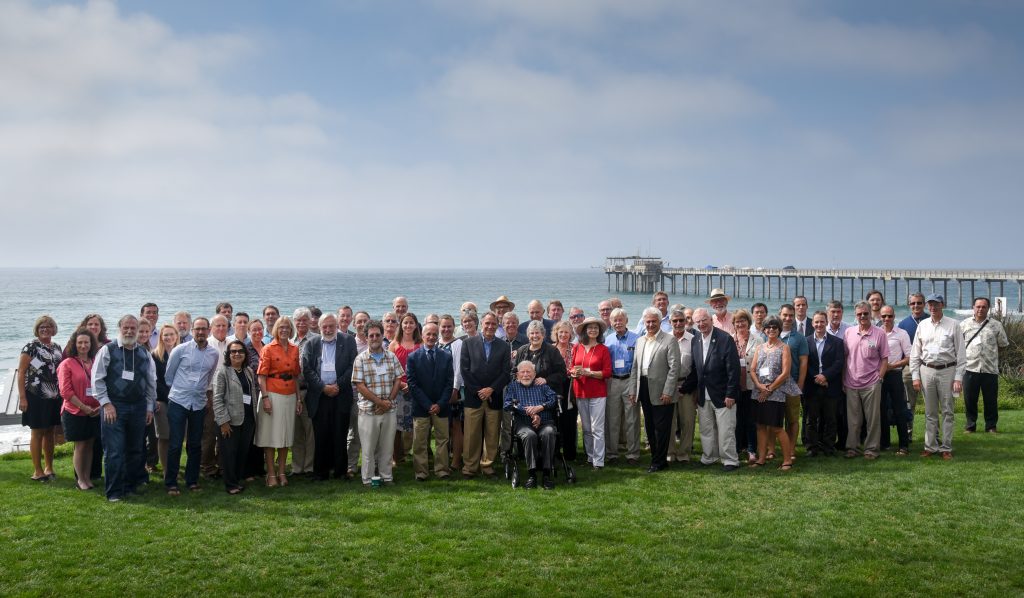
Group photo, August 29, 2017
Day 1 – Monday, May 15
Internal Wave Breaking, Turbulence, and Ocean Mixing
Session Leaders: Amy Waterhouse (morning) and Hieu Pham (afternoon)
Topics:
- Shear driven vs. convective breaking
- Boundary vs. deep sea mixing
- Patchiness and intermittency
- Parameterizing ocean mixing
Speakers:
Margaret Leinen, Director, Scripps Institution of Oceanography, UC San Diego
Welcome and logistics
Mike Gregg, University of Washington
Now for the second act, fifty years after Abyssal Recipes (presentation)
Trevor McDougall, University of New South Wales (UNSW), Australia
Upwelling and downwelling in the deep ocean; how much is there of both? (presentation)
Ray Schmitt, WHOI
Malice Aforethought: The Making of an Iconic Figure (presentation)
Ann Gargett, Institute Ocean Sciences, Victoria, Canada
Beyond dissipation (presentation)
Jim Moum, Oregon State University
Ocean Mixing Time Series (presentation)
Video
Day 2, Tuesday, May 16
The Physics of the Oceanic Internal Wave Field
Session Leaders: Sean Haney (morning) and Gunnar Voet (afternoon)
Topics:
- Internal tides
- Near inertial waves
- Waves and topography
- The wave spectrum and spectral transfers
Speakers:
Ken Melville, Scripps Institution of Oceanography
Introduction
Ola M. Johannessen, Nansen Scientific Society, Norway
Observations of mesoscale processes and internal waves in the marginal ice zone in the Fram Strait and Greenland Sea, a brief review (presentation)
Chantal Staquet, LEGI, University of Grenoble, France
Processes leading to energy transfer from the internal tide
Leif Thomas, Stanford University
Modifications of wind-driven internal waves by vorticity from planetary scales to submesoscales: Our current understanding and outstanding questions that remain (presentation)
Ruth Musgrave, MIT
Processes leading to mixing by the tides near topography
Kurt Polzin, WHOI
Particularly marginal mixing theories
Video
Day 3, Wednesday, May 17
Internal Waves, Mixing, and the Overturning Circulation of the Ocean
Session Leaders: Sarah Purkey (morning) and Ali Mashayek (afternoon)
Topics:
- Global energetics
- Mixing and climate models
- Paleo mixing
- What is “yet to be learned”that really matters?
Speakers:
Peter Wadhams, University of Cambridge, UK
Introduction
Toshiyuki Hibiya, University of Tokyo, Japan
What we have learned about deep ocean mixing in the past 20 years
Harper Simmons, University of Alaska Fairbanks
Global views of the ocean internal tide and inertial oscillations (presentation)
Raffaele Ferrari, MIT
Recent developments in the theory of abyssal circulation (presentation)
Klaus Hasselmann, Max Planck Institute fur Meteorologie, Hamburg, Germany
Waves, Walter and the next 100 years (presentation)
Carl Wunsch, MIT
The Global Internal Wave Field, 1917-2117, Unanswered questions (presentation)
Walter Munk (presentation)
Jess Carriere-Garwood, Maddie Hamann, Cesar Rocha
Student-led summary discussion
